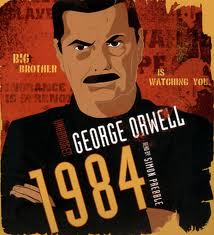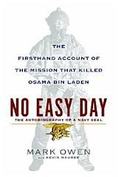 I finally got around to reading the classic 1984 by George Orwell (I like to mix it up between technical/programming books, fiction, and non-fiction/business/design books). This book was a chilling account of a future, uber-totalitarian world. Reading it shortly after Atlas Shrugged, I actually found a lot in common between the two texts. In Ayn Rand's book, the heroes overtly portray the virtues of selfishness, individualism, and capitalism, whereas in George Orwell's book, he teaches the same lessons by contrast: the heroes can only try to subvert the system, and the reader sees the horrors that happen when the opposite (collectivism and loss of rationality) takes over. Some of the descriptions in the book were so graphic and emotional that I had a hard time at first figuring out whether the author was serious (a fan of collectivism) or not; I was pretty sure he wasn't, but he made the point very clear of how a mass of people could be brainwashed into accepting it and losing individual rationality. I also wondered whether there were elements of satire and commentary on the political environment of his time or whether he was just commenting on a (bad) possible future. Part 1 Ch 1
Ch 1
Ch 1
1 Comment
Healthcare is an enormous part of our economy and arguably the part of our lives that is the most fundamentally important to determining our quality of life and happiness. But there is so much that is inefficient and can be improved. I wanted to briefly describe a few of the major problems, trends, and opportunity areas that excite me about the field.
Doctor payment models Problem: Most doctors get paid on a fee for service model rather than an outcome model. This incentivizes more treatment and tests and does not punish readmissions/disease relapses. Measuring quality and outcomes in medicine is actually a very ill-defined and difficult challenge in and of itself. A medical problem could come from four areas (doctor's advice, patient genetics, patient choices, and external events), with the doctor only involved in one of them. Nonetheless, there must be something better we can do than the current state of affairs. Somehow, it would be nice to align doctor incentives with patient health and allow more fluid access to care when people need it. Some of the current quality-tied compensation schemes are a step in that direction, but they are too narrowly defined and promote gaming the system. Projects like "medical homes" as well as some HMOs are making good progress in this direction. It would be nice if primary care doctors earned more so we had more of them (we are in desperate shortage now, which will only exacerbate with health care reform). They should also have more authority and pay when they keep their patients healthy as well as earn money for extra counseling around lifestyle issues (currently they don't earn for that). Insurance company incentives Insurance companies should incentivize health, not just pay for cures. While it is difficult, prevention is preferable to treatment. Not just HMOs, but all insurance companies should be paying our gym memberships and giving us rewards for using them (check in at the gym), subsidizing our expensive Whole Foods organic food purchases and multivitamins, giving us money for not smoking or drinking, etc. I learned that the reason a lot of this doesn't happen is that people switch individual insurance carriers frequently, and the benefits of positive lifestyle choices are only reaped over the long-term (by which point the insurance company might have been changed out). Insurance companies that see patient claims as "losses" as opposed to normal operating costs seem backwards. I want companies that will incentivize health and be customer-service organizations, chosen by people for their helpfulness rather than simply as a lesser among evils. Electronic medical records There are many EMR systems out there already, and the government provides incentives to install them and "meaningfully use" them. However, from doctors I've spoken to, I've learned that most are still clunky and limited, aren't designed with the doctor and patient in mind (i.e., not human-centered), and most painfully of all, aren't interoperable. The vision of electronic records is that they would enable people to carry their data across providers and improve communication across organizations, but that hasn't yet been solved. Many people complain of doctors who don't communicate effectively, and part of it is behavior change and training, but another part is the tools available. I'm wondering whether countries that offer "universal healthcare" are different in regards to the problems mentioned above. I know they are much worse in terms of doctor waiting times (which are expected to increase substantially in the US after health care reform) and have worse access to the top-of-the-line medical tech. But are their doctors more collaborative? What other problems do they have? Real-time home monitoring technology This is very closely related to what Paul Graham wrote about as "ongoing diagnosis." We only seek care when we have symptoms, as opposed to knowing much earlier if something is sub-optimal in our body and correcting it then and there. This is very aggressive and difficult from the technology standpoint, but that's why it also makes it really exciting for me. I've always dreamed of a machine that can scan my body quickly at home and tell me if I have broken bones or infections. Taking this one step further, it would "push" this info to me whenever my body state changes adversely instead of me having to repeatedly poll for it. This seems really cool and also really hard.  A friend of mine told me about No Easy Day by Mark Owen way before it got its press notoriety. The story was written by a Navy SEAL who participated in many historic missions, such as saving the hostages from the Somali pirates and the raid on Osama bin Laden. I was interested in checking it out for the details of how SEALs train and organize and less so for the political details surrounding the UBL raid. Luckily, this was how the author felt as well, as his story was direct, fact-based, and with practically no political or emotional rhetoric. I enjoyed learning about how SEALs train, how they organize their own gear, and how they manage their attitude in the face of grueling hours and immense physical burden. The book was inspiring and gave me some good advice about perseverance, like just focusing on getting to the next meal when enduring difficult work or training. Despite the author's incredibly significant accomplishments, he remained humble throughout the entire book, and several times, he even said that when you start celebrating your own hype, that's when you're in for trouble. I like that attitude of focusing on reality and getting stuff done. I was also impressed with his immense dedication to his work and his love of it, and how that drove him to make difficult decisions for the benefit of his work. That was an example of the good/right definition of selfishness.
Prologue
|
Archives
June 2024
Categories
All
Subscribe |

 RSS Feed
RSS Feed
